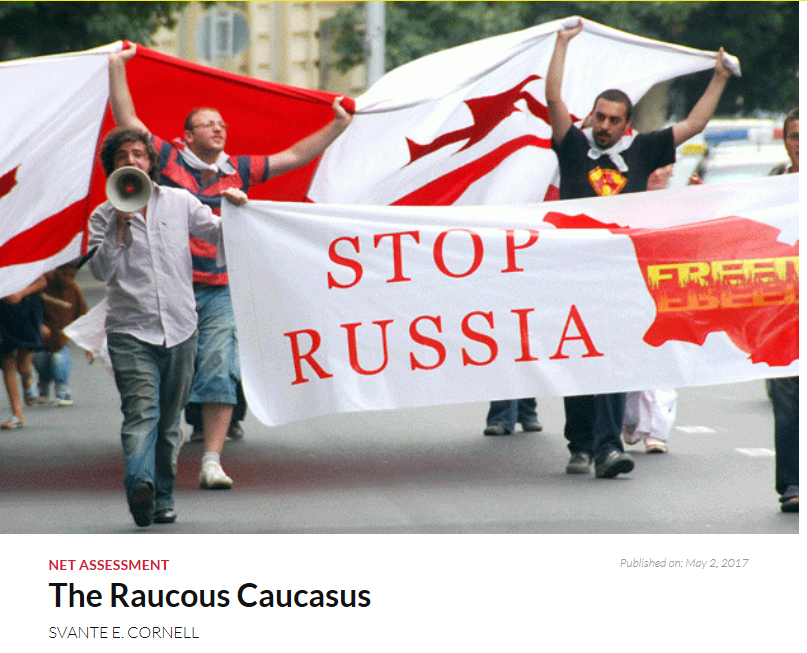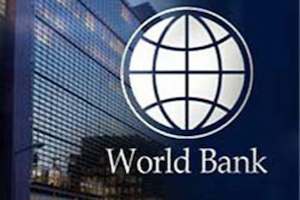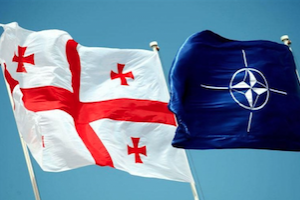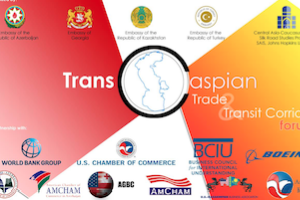The Raucous Caucasus
Article, The American Interest, May 2, 2017
Svante E. Cornell,
The United States must restore its leverage and credibility in the restive region caught between Russia, Turkey, and Ira

Under the Radar: Georgia’s October 2016 Elections
Strategic Pillars of Security for Georgia: Trans-Atlantic Integration, Economy, Democracy
Levan Mikeladze Foundation for the Caucasus Studies
and
Central Asia-Caucasus Institute at Johns Hopkins SAIS
invite you to participate in the conference
Strategic Pillars of Security for Georgia:
Trans-Atlantic Integration, Economy, Democracy
Thursday, May 12, 2016
1:00 pm - 7:00 pm
Kenney Auditorium
Paul H. Nitze School of Advanced International Studies
1740 Massachusetts Ave, NW, 20036
Washington, DC
Conference Program
1:00 – 1:15
Registration / Check-in
1:15 – 1:30
Welcome: Mamuka Tsereteli, Central Asia-Caucasus Institute
Tina Mikeladze, Levan Mikeladze Foundation for Caucasus Studies
1:30 – 3:00
Georgia and Strategic Environment in the Black Sea-Caspian Region
Moderator: S. Enders Wimbush, Founder, Stratevarious/Member of the Advisory Board, LMF
Discussants: Kurt Volker, McCain Institute, Former US Ambassador to NATO
James MacDougall, Professor, National War College
Amb. William Courtney, Former US Ambassador to Georgia
Amb. Archil Gegeshidze, Ambassador of Georgia to the US
Svante Cornell, Director, Central Asia-Caucasus Institute
Job Henning, Fellow, Truman National Security Project
Glen Howard, President, Jamestown Foundation
Brenda Shaffer, Visiting Professor, Georgetown University
3:00 – 3:45
Remarks: Bridget Brink, Deputy Assistant Secretary of State
David Bakradze, State Minister of Georgia on European and Euro-Atlantic Integration
David Dondua, Deputy Minister of Foreign Relations, Georgia
3:45 – 4:00 Coffee Break
4:00 – 5:30
Internal Factors of Security in Georgia: Conflicts, Economy, Democracy
Moderator: Elizabeth Kvitashvili, President, Georgian Association in the USA
Discussants: Stephen Nix, Director for Eurasia, IRI
Melissa Muscio, Senior Manager, Caucasus and Central Asia, NDI
Jeffrey Mankoff, Senior Fellow, CSIS
George Khelashvili, DCM, Embassy of Georgia
Danica Starks, Policy Team Director for Eurasia, Dept. of Commerce
Kenneth Angell, Managing Director, SMEF, OPIC
Eftychis Gregos-Mourginakis, Executive Director, America-Georgia Business Council
Miriam Lanskoy, Senior Director for Eurasia, National Endowment for Democracy
David Soumbadze, Director, Rumsfeld Fellowship Program, CACI/LMF
5:30 - 5:45
Closing Remarks: S. Frederick Starr, Chairman, Central Asia-Caucasus Institute
5:45 – 7:00
Closing Reception, sponsored by Georgian Association in the USA
Georgian Association Annual Award Ceremony with Co-chairs of the Georgia Caucus in the House of Representatives: Congressman Ted Poe, R-Texas, Congressman Gerry Connolly, D-Virginia
Please register using this link.
TRANSIT FORUM: Trans-Caspian East-West Trade and Transit Corridor
TRANSIT FORUM with the Embassies of Azerbaijan, Georgia, Kazakhstan, and Turkey
Thursday, 28 April, 2016, from 8 a.m. to 4 p.m.
The Central Asia, Caspian, South Caucasus and Black Sea regions together form a strategically important transit corridor between China and Europe. Connecting trade, people and economies, the modern trans-Caspian trade and transit routes from China to Europe, envisages an extensive and integrated network of infrastructure, special economic zones, harmonized customs, and cross-border procedures along this route.
Azerbaijan, Georgia, Kazakhstan and Turkey combined represent a market of more than 110 million consumers. These countries are able to offer customized and integrated solutions to companies with highly sophisticated supply chains.
Video of the forum can now be viewed on the SAIS Events YouTube channel.
On Thursday, April 28, 2016, the Embassies of Azerbaijan, Georgia, Kazakhstan, and Turkey to the U.S.A., are organizing the “Trans-Caspian East-West Trade and Transit Corridor” Forum in Washington, D.C., in partnership with the World Bank Group, U.S. Chamber of Commerce, Business Council for International Understanding, Boeing Company, U.S.-Azerbaijan Chamber of Commerce, AmCham Azerbaijan, America-Georgia Business Council, U.S.-Kazakhstan Business Association, AmCham Kazakhstan, AmCham Georgia, and Turkish-American Business Association/AmCham Turkey.
This special all-day forum, hosted by the Central Asia and Caucasus Institute at SAIS-Johns Hopkins University, will introduce projects and investments along the modern Silk Road to U.S. business leaders across a variety of multinational industries.
Speakers at this special forum include: Ambassador Elin Suleymanov, Azerbaijan; Ambassador Archil Gegeshidze, Georgia; Ambassador Kairat Umarov, Kazakhstan; Ambassador Serdar Kılıç, Turkey; Mr. Gary Litman, VP, US Chamber of Commerce; S. Frederick Starr, Chairman, Central Asia-Caucasus Institute, JHU-SAIS; Dr. Taleh Ziyadov, Director-General, Baku International Sea and Trade Port; Mr. Rauf Valiyev, Chairman, Azerbaijan Caspian Shipping; Mr. Mamuka Bakhtadze, CEO, Georgian Railways; Ms. Ketevan Salukvadze, Head of Transport Policy Dept., Ministry of Economy and Sustainable Development; Mr. Askar Mamin, President, Kazakhstan Railways; Mr. Sanzhar Yelubayev, President of KTZ Express; Mr. Osman Nuri Beyhan, Deputy Director General for EU and International Affairs, Ministry of Customs and Trade; and others TBA.
Schedule, Thursday, 28 April 2016:
8:00 - 9:00 a.m. Continental breakfast
9:00 - 10:00 a.m. Welcome by the Central Asia-Caucasus Institute, the US
Dept of State, Ambassadors of Azerbaijan, Georgia,
Kazakhstan, and Turkey, and representatives from the US
Chamber of Commerce
10:00 - 11:00 a.m. Panel #1: "Trans-South Caucasus Customs and Trade
Facilitation: What Needs to Be Done?"
Moderator: S. Frederick Starr
11:00 - 11:25 a.m. Q & A
11:25 - 11:40 a.m. Break (refreshments)
11:40 - 12:40 p.m. Panel #2: "'From Sea to Sea' Integrated Regional Transit
and Logistics Infrastructure."
Moderator: TBD
12:40 - 1:00 p.m. Q & A
1:00 - 2:00 p.m. Lunch served in the auditorium
2:00 - 3:00 p.m. Panel #3 "Commercial and Investment Opportunities:
Financing, Logistics, and Supply Chain."
Moderator: Jorg Frieden, Executive Director, The World
Bank Group
3:00 - 3:25 p.m. Q & A
3:25 - 4:00 p.m. Closing remarks
SAIS - Johns Hopkins University
1740 Massachusetts Ave., NW
Washington, DC 20036
Bridging the Gap: the Environment and Economic Development in Georgia

Bridging the Gap: the Environment and Economic Development in Georgia
Wednesday, November 18, 2015, from 5 to 7 p.m.
(reception at 5 p.m., followed by main program at 5:30)
Can economic development and growth be achieved under poorly managed environment with significant negative impact on health of population? Our speakers will discuss the World Bank's country environmental assessment report: Institutional, Economic, and Poverty Aspects of Georgia’s Road to Environmental Sustainability. Objective of the study was to analyze current status of the environment in Georgia and to demonstrate how environmental sustainability, economic growth, and prosperity can be mutually supportive goals. Study offers policies to address these problems.
A recorded version of this event may be viewed on the SAIS events channel.
Speakers:
Kulsum Ahmed
Practice Manager, Europe and Central Asia, Environment and Natural Resources Global Practice, The World Bank
Adriana Damianova
Team Leader of the CEA, Europe and Central Asia, Environment and Natural Resources Global Practice, The World Bank
Mamuka Tsereteli,
Research Director, Central Asia-Caucasus Institute
Moderator: S. Frederick Starr, Chairman, Central Asia-Caucasus Institute
Location:
Rome Building Auditorium
SAIS - Johns Hopkins University
1619 Massachusetts Ave., NW
Washington, DC 20036




